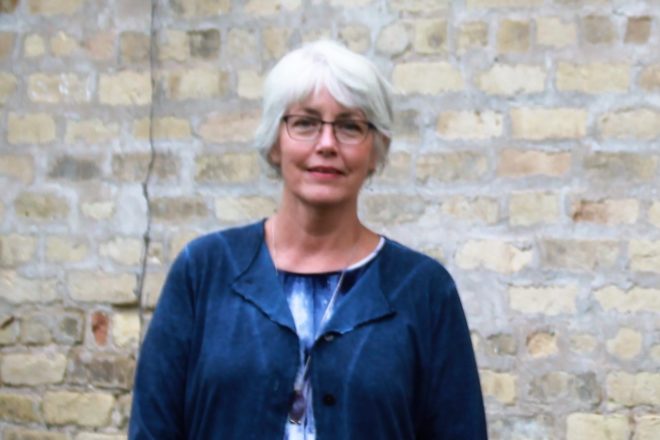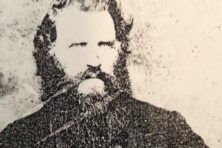A Life Doula’s Perspective on Death
- Share
- Tweet
- Pin
- Share

Most people prefer not to think about death, but Algoma-based life doula Marggie Moertl wants to change that. Rather than fearing death or finding it sad, she looks upon it as a joyous process that brings loved ones together and prompts self-reflection.
“I’m so comfortable with death,” she said. “I can see the joy in it and understand that our physical life is just one piece of who we are, so that when we are ready to lose our physical body, it is a joyous moment.”
Moertl helps people in Door and Kewaunee counties to pass away more comfortably by making the dying process easier, but understandably, this looks different for each client, based on the individual’s age, health issues and relationship with death. Although most of her clients are elderly, she has also worked with young people who have had terminal illnesses.
For many clients, Moertl soothes fears about death and encourages those on their final journeys to reflect upon their lives. A big part of her role also involves providing support to the dying person’s family and friends.
“I probably do more to support [the family and friends] than [to support] the person who’s dying,” she said.
Moertl has been an active life doula since 2016. Before that, she spent 45 years as a nurse, and in the “final chapter” of her nursing career, she shifted from public health and home-care nursing to hospice nursing.
That was her first experience interacting with people who were dying, and she was apprehensive about it at first. Soon, though, she realized that her interactions with these patients were meaningful.
“When you’re at the end of life, it instinctively becomes a process of looking at who you are, where you’ve been, wanting forgiveness, giving it – all of the spiritual components of life,” Moertl said.
That’s part of why she finds the dying process so joyous. One of her favorite parts of her job is what she refers to as a “living wake,” when the dying client’s family and friends gather around the bedside, crying as they tell stories and relive happy memories.
Though Moertl loved being a nurse, she didn’t love the constant pressure it entailed and wanted more time to connect with each patient. That’s what pushed her toward becoming a life doula.
“That’s really what I love about my role now,” she said. “I am completely available for the person and their loved ones. I’m completely present to them. There’s no rush. There’s no agenda.”
Not all of Moertl’s clients are actively dying. In many cases, she’s hired early, after a client receives a diagnosis. At that point, she might meet with her client once a week to start getting to know them. Then when the client begins a more active dying process, she visits more often. Moertl is not always there at the time of death, but she’s there for the family afterward, helping them through the bereavement process.
Few clients know what to expect when they hire her, she said, but after they build a relationship, she’s heard from many about how valuable her services have been.
“I had a client in the recent few years who, just before he passed, called and said, ‘You have got to be sure you continue this work,’” Moertl said.
Because of how immersive the job is, she takes on only one client at a time. Clients contact her, and the two start working together after determining whether they’ll be a good fit. When she doesn’t have a client, she writes, leads a prayer circle and heads a group on journaling through grief.
The intimacy of the job means that Moertl can grow quite close to her clients, which also means that she must be intentional about monitoring her emotions.
“The important thing is – if you’re going to hold space for people – to know who you are, what your triggers are, what your emotions are,” she said. “It’s no problem to have those emotions and walk with that, but it still requires some professional boundaries – keeping tabs on where I’m at and who I am.”
Though being a life doula isn’t easy, Moertl loves her work and the understanding of death that it has given her – an understanding that has been constantly changing since 2016.
“It’s an ongoing spiritual evolvement,” she said.


